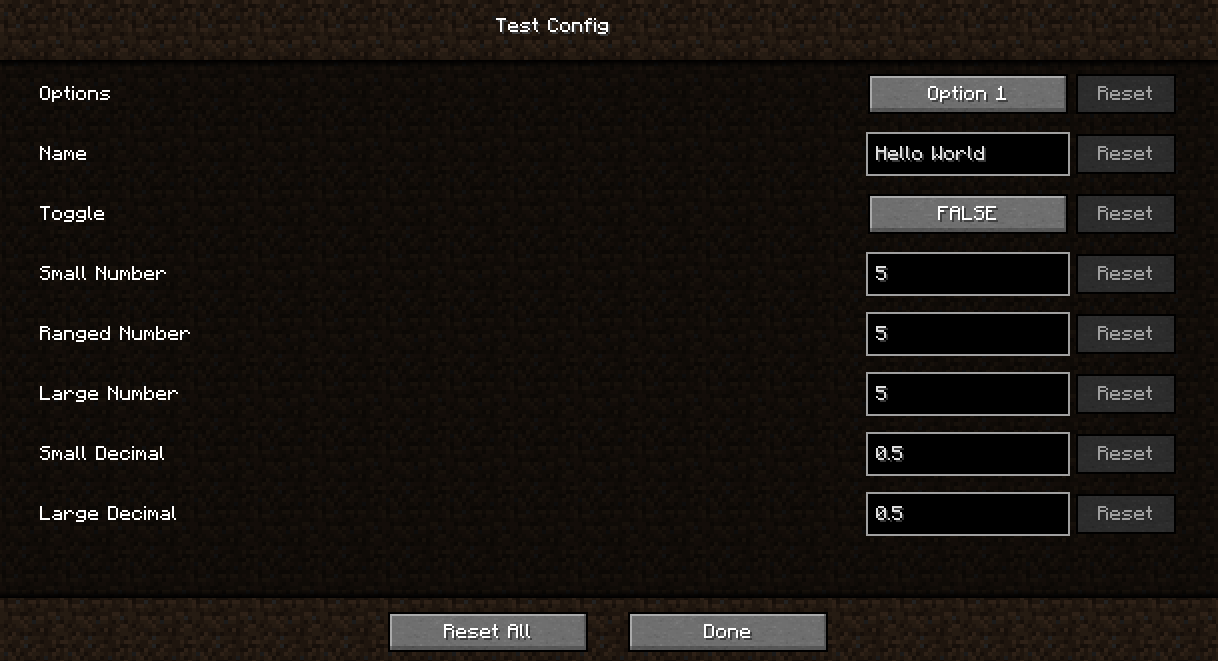Simple-Mod-Config
Getting Started
Simple Mod Config can be run on either the client or the server
Config File
The SimpleConfig annotation is used in Minecraft modding with the Architectury library to define a simple
configuration for a mod. It can be applied to fields of specific types to provide a user-friendly interface for users to
modify the mod’s settings.
The SimpleConfig annotation also includes several optional parameters. The index parameter specifies the order in
which configuration fields are displayed in the user interface. The displayName parameter provides a friendly name for
the configuration field. The description parameter provides additional information about the configuration field.
The min and max parameters can be used to specify the minimum and maximum values for numerical configuration fields.
The options parameter can be used to define a set of allowed values for the configuration field.
String Config
@SimpleConfig()
public String Name="Hello World";
String Config with Options
@SimpleConfig(options = {"Option 1", "Option 2", "Option 3", "Option 4", "Option 5", "Option 6"})
public String Options="Option 1";
Boolean Config
@SimpleConfig()
public boolean Toggle=false;
Numbers
@SimpleConfig(displayName = "Small Number")
public int SmallNumber=5;
@SimpleConfig(displayName = "Large Number")
public long LargeNumber=5;
@SimpleConfig(displayName = "Small Decimal")
public float SmallDecimal=.5f;
@SimpleConfig(displayName = "Large Decimal")
public double LargeDecimal=.5d;
Example
public class TestConfig
{
@SimpleConfig(index = 1, description = "This is a String template")
public String Name = "Hello World";
@SimpleConfig(index = 0, description = "This is a option selection template", options = {"Option 1", "Option 2", "Option 3", "Option 4", "Option 5", "Option 6"})
public String Options = "Option 1";
@SimpleConfig(index = 2)
public boolean Toggle = false;
@SimpleConfig(index = 3, displayName = "Small Number", description = "This is an example of a 32bit whole number")
public int SmallNumber = 5;
@SimpleConfig(index = 4, displayName = "Ranged Number", description = "This is an example of a 32bit whole number with a min and max", min = 0, max = 32)
public int RangeNumber = 5;
@SimpleConfig(index = 5, displayName = "Large Number")
public long LargeNumber = 5;
@SimpleConfig(index = 6, displayName = "Small Decimal")
public float SmallDecimal = .5f;
@SimpleConfig(index = 7, displayName = "Large Decimal")
public double LargeDecimal = .5d;
public String unused = "";
}
Common
public static SimpleModConfigBuilder builder;
public static ConfigHandler<TestConfig> configHandler;
public static void initConfig()
{
Component displayName=Component.literal("Test Config");
configHandler=new ConfigHandler<>("test-config",new TestConfig(),displayName);
builder=new SimpleModConfigBuilder(configHandler)
.withCommand("test-config",displayName);
}
Client
public void initClient()
{
builder.withKey(InputConstants.KEY_NUMPAD0,"mod_id.category");
}
Using Config Values
Getting and setting values is quite simple.
Get Value
String name=configHandler.getConfig().Name;
Set Value
configHandler.set("Name","new value");
Screenshot
